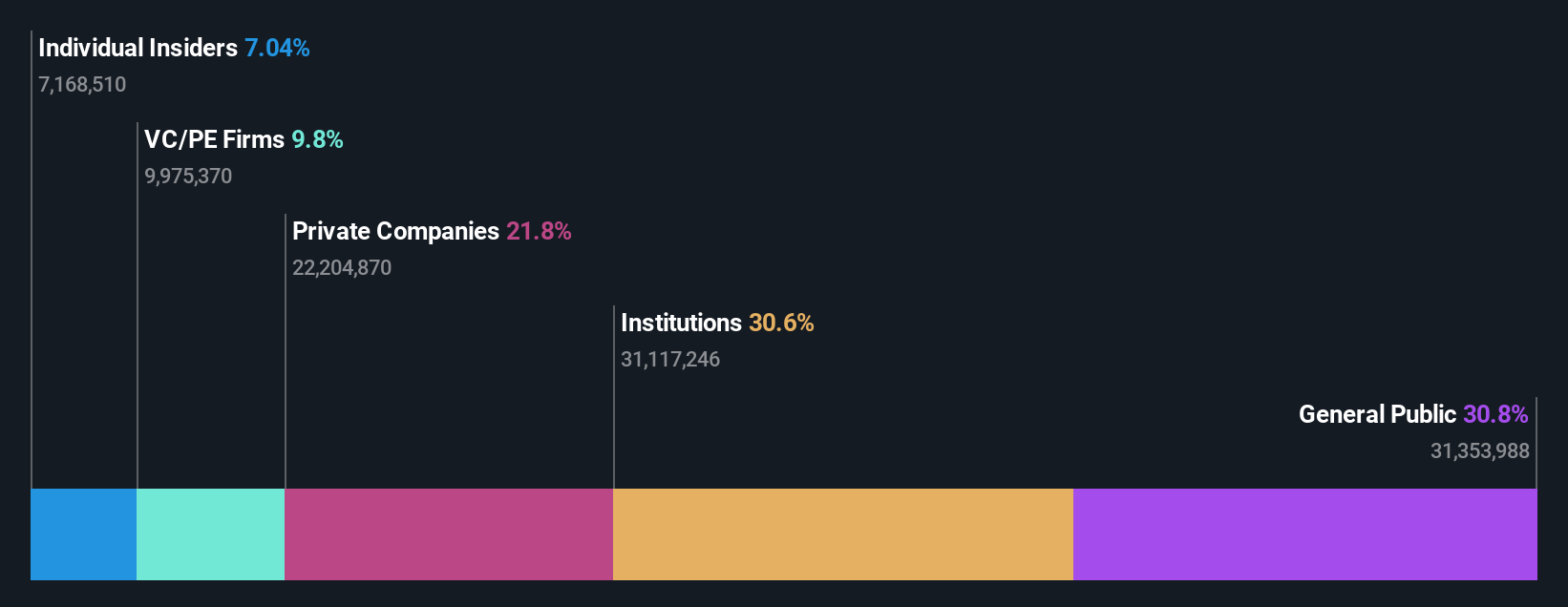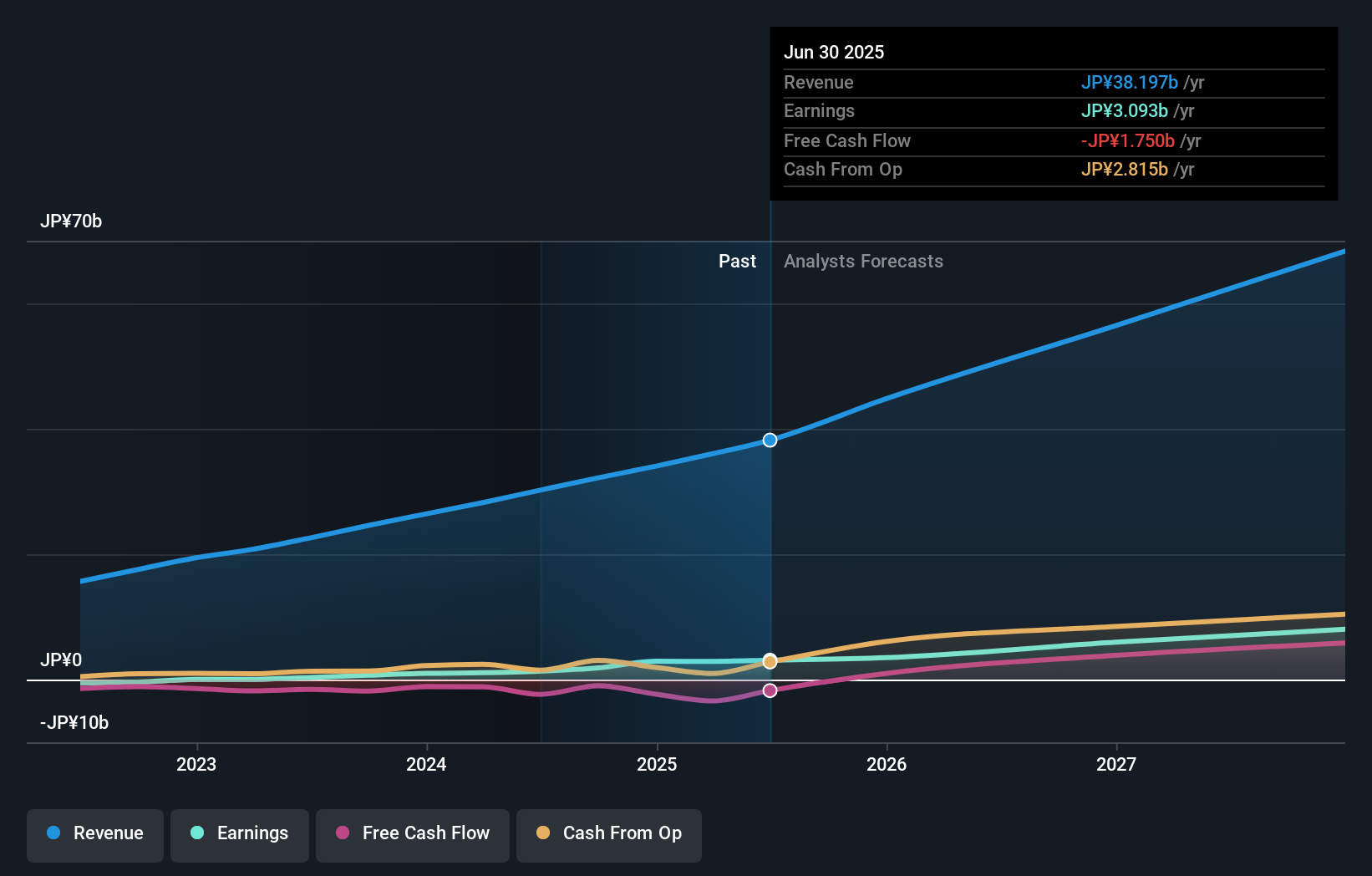Painful week for individual investors invested in Appier Group, Inc. (TSE:4180) after 11% drop, institutions also suffered losses
Key Insights
- Appier Group's significant individual investors ownership suggests that the key decisions are influenced by shareholders from the larger public
- The top 7 shareholders own 53% of the company
- Institutional ownership in Appier Group is 31%
If you want to know who really controls Appier Group, Inc. (TSE:4180), then you'll have to look at the makeup of its share registry. And the group that holds the biggest piece of the pie are individual investors with 31% ownership. Put another way, the group faces the maximum upside potential (or downside risk).
While institutions, who own 31% shares weren’t spared from last week’s JP¥19b market cap drop, individual investors as a group suffered the maximum losses
In the chart below, we zoom in on the different ownership groups of Appier Group.
See our latest analysis for Appier Group

What Does The Institutional Ownership Tell Us About Appier Group?
Institutions typically measure themselves against a benchmark when reporting to their own investors, so they often become more enthusiastic about a stock once it's included in a major index. We would expect most companies to have some institutions on the register, especially if they are growing.
We can see that Appier Group does have institutional investors; and they hold a good portion of the company's stock. This suggests some credibility amongst professional investors. But we can't rely on that fact alone since institutions make bad investments sometimes, just like everyone does. If multiple institutions change their view on a stock at the same time, you could see the share price drop fast. It's therefore worth looking at Appier Group's earnings history below. Of course, the future is what really matters.

Hedge funds don't have many shares in Appier Group. Our data shows that Plaxie Inc. is the largest shareholder with 17% of shares outstanding. Meanwhile, the second and third largest shareholders, hold 9.8% and 8.0%, of the shares outstanding, respectively. Furthermore, CEO Chih-Han Yu is the owner of 1.4% of the company's shares.
On further inspection, we found that more than half the company's shares are owned by the top 7 shareholders, suggesting that the interests of the larger shareholders are balanced out to an extent by the smaller ones.
While it makes sense to study institutional ownership data for a company, it also makes sense to study analyst sentiments to know which way the wind is blowing. There are plenty of analysts covering the stock, so it might be worth seeing what they are forecasting, too.
Insider Ownership Of Appier Group
The definition of company insiders can be subjective and does vary between jurisdictions. Our data reflects individual insiders, capturing board members at the very least. Management ultimately answers to the board. However, it is not uncommon for managers to be executive board members, especially if they are a founder or the CEO.
Most consider insider ownership a positive because it can indicate the board is well aligned with other shareholders. However, on some occasions too much power is concentrated within this group.
Our most recent data indicates that insiders own some shares in Appier Group, Inc.. This is a big company, so it is good to see this level of alignment. Insiders own JP¥11b worth of shares (at current prices). If you would like to explore the question of insider alignment, you can click here to see if insiders have been buying or selling.
General Public Ownership
With a 31% ownership, the general public, mostly comprising of individual investors, have some degree of sway over Appier Group. While this group can't necessarily call the shots, it can certainly have a real influence on how the company is run.
Private Equity Ownership
With an ownership of 9.8%, private equity firms are in a position to play a role in shaping corporate strategy with a focus on value creation. Some investors might be encouraged by this, since private equity are sometimes able to encourage strategies that help the market see the value in the company. Alternatively, those holders might be exiting the investment after taking it public.
Private Company Ownership
Our data indicates that Private Companies hold 22%, of the company's shares. Private companies may be related parties. Sometimes insiders have an interest in a public company through a holding in a private company, rather than in their own capacity as an individual. While it's hard to draw any broad stroke conclusions, it is worth noting as an area for further research.
Next Steps:
It's always worth thinking about the different groups who own shares in a company. But to understand Appier Group better, we need to consider many other factors. For example, we've discovered 1 warning sign for Appier Group that you should be aware of before investing here.
Ultimately the future is most important. You can access this free report on analyst forecasts for the company.
NB: Figures in this article are calculated using data from the last twelve months, which refer to the 12-month period ending on the last date of the month the financial statement is dated. This may not be consistent with full year annual report figures.
New: Manage All Your Stock Portfolios in One Place
We've created the ultimate portfolio companion for stock investors, and it's free.
• Connect an unlimited number of Portfolios and see your total in one currency
• Be alerted to new Warning Signs or Risks via email or mobile
• Track the Fair Value of your stocks
Have feedback on this article? Concerned about the content? Get in touch with us directly. Alternatively, email editorial-team (at) simplywallst.com.
This article by Simply Wall St is general in nature. We provide commentary based on historical data and analyst forecasts only using an unbiased methodology and our articles are not intended to be financial advice. It does not constitute a recommendation to buy or sell any stock, and does not take account of your objectives, or your financial situation. We aim to bring you long-term focused analysis driven by fundamental data. Note that our analysis may not factor in the latest price-sensitive company announcements or qualitative material. Simply Wall St has no position in any stocks mentioned.
About TSE:4180
Appier Group
A software-as-a-service company, provides artificial intelligence (AI) platforms for enterprises to make data-driven decisions in Japan and internationally.
Flawless balance sheet with solid track record.
Similar Companies
Market Insights
Community Narratives



